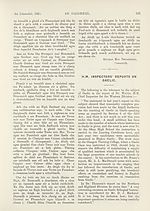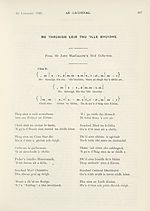An Comunn Gàidhealach Publications > Gaidheal > Volume 20, October 1924--September 1925
(174) Page 166
Download files
Complete book:
Individual page:
Thumbnail gallery: Grid view | List view

166
AN GAIDHEAL.
An Lunasdal. 1925.
A GAELIC GLOSSARY.
By Bonald Burn, Humanity Department, University, Glasgow
alachag: block for splitting wood on, hacking-
block, chopping-stock: Braemore, Mathe-
son, n.: Kilmuir, Angus MacDonald,
n.: cf. cipean. Ealag in Coll and Loch-
aber.
alla-ghrabadh: a sudden upset, a disconcert¬
ing crisis sudden but by no means neces¬
sarily ending disastrously (though it might
so end); a serious emergency and
unexpected catastrophe that may tum out
all right or may have a fatal issue but
whose suddenness is the main point: Coll,
MacDougall, n.
amadan: jester, “King’s fool,’’ one who
plays the fool rather than is a complete
one, merryandrew S. Uist, MacEachen,
n. : Watemish, MacAskill, n. : Coll,
MacDougall, n. : Lochaber, Mrs. Spence,
n. : cf. oinisd, amaistear, ciil-bhuirt.
S.U. says:—’S fheairrde cuideachd ball-
biiirte amadain. (Buirte sounds as though
spelt bumhst.) The following S.U. story
illustrates the usual kind of amadan or
Gothamite:—Two lairds, each with his
own jester, resolved to test which had the
silliest. So they were sent to gather
mussels on the rocks whereon a gold piece
had been laid. One came across it and
told the other noodle, who replied: ’Nuair
bhios sinn ri maorach bithich sinn a’
maorach, ’s nuair a’ bhios sinn aig 6rach
bidh sinn aig 6rach. Fag an sin e. Which
the finder (instead of having quietly
pocketed it on discovering the coin)
did. So on their return without the gold
the lairds found each was equally silly (cf.
amaisteal).
amaisteal: man who puts his foot into it
(accidentally) by some senseless deed;
one who by e.g. barging about creates a
diversion in a crowd, a silly lubber, a
harmless ass: N. Uist, MacDonald, n. :
Barra, Fr. MacMillan, n. : cf. (bladag,
sglkmhach, etc.) oinisd, amadan, aimisgil,
buamastair.
amaistear: a half-wit, a half-dottled body:
Lochaber, Mrs. Spence, n. : Barra, Fr.
MacMillan, n. : Braemore, Matheson, n. :
cf. innisd, oinisd, eabaistear (buamastair),
blabhdaire. Amadan in Kilmuir, etc.
a mar: mill-lead: Creag an Amair, the
caimed 1750 contour hill N.N.E. of
Corrour Lodge (O.S. name not quite
right); map also gives Amar Srath Oisein
near by (have not verified this name nor
its meaning): Cameron, gardener at
Lodge: S. Uist, MacEachen, n.: Islay,
Duncan Johnston, n. Given by M‘B. but
not Dw. Cf. abhainn, ligeadh (draghann,
sgial, moidhle), 16nan. = Channel in Islay
as well. Lochaber and Kilmuir have
eileach for the mill-race (cf. MacBain),
and a W. Lochaber native did not know
amar, nor does Kilmuir.
amhach: in phrase ge b’oil le t’ amhaich, in
spite o’ yer neck, as Tomintoul (etc.).
Scotch says, i.e. willy-nilly, whether you
will or no, in spite of your teeth:
Lochaber, Mrs. Spence, n.: Coll, Mac¬
Dougall, n. : Braemore, Matheson, n.:
Barra, Fr. MacMillan, n.: S. Uist, Mac¬
Eachen, n.: Lewis, Norman MacLeod,
n. : Tiree, Mrs. MacL., n.; Skye,
Angus MacDonald, n. : cf. casa-beaga,
buille-trot, bean Draighnidh. Also ge
b’oil le chorp, co-theireadh e, in
Coll. Or any member of body may be
so used in Barra, etc. S. Uist, Islay,
and Watemish also say: dhain-dheoin
t’amhaich, or: dh. do mhuineal. Islay
uses amhach usually only of animals.
amhain: death by choking, misadventure
resulting in strangling (of man or beast):
Islay, Duncan Johnston, n.: also of sheep
lying helpless on back. Cf. amhuinn.
Pronounced ef-an, but Johnston will not
allow me to spell it eafan or eifean because
he is convinced that it is from the same
root as Coll amhainn below.
amhainn: dry hollow into which beast falls
(especially if weak), and one deep enough
to make it hard for the animal to get out
if once caught, a (possible) ‘death trap,’
a (potentially) ‘dangerous place’ (fern.):
Coll, MacDougall, n. : Moidart, Miss M.
MacIntyre, n. Cf. athan, athainn, fdithe,
aibhin, dig, and (Dw.’s) amhain. The
word is relative in that it applies to a
hollow only as long as the beast is in it;
once out, or if no beast fall in, the pit is
no longer an amhainn. SO' too a quarry
into which on a dark night a man had
fallen would be a death-trap as long as
he was there, but once extricated it would
merely be called a quarry again. Pro¬
nounced aow-heeny’.
(Ri leantainn.)
AN GAIDHEAL.
An Lunasdal. 1925.
A GAELIC GLOSSARY.
By Bonald Burn, Humanity Department, University, Glasgow
alachag: block for splitting wood on, hacking-
block, chopping-stock: Braemore, Mathe-
son, n.: Kilmuir, Angus MacDonald,
n.: cf. cipean. Ealag in Coll and Loch-
aber.
alla-ghrabadh: a sudden upset, a disconcert¬
ing crisis sudden but by no means neces¬
sarily ending disastrously (though it might
so end); a serious emergency and
unexpected catastrophe that may tum out
all right or may have a fatal issue but
whose suddenness is the main point: Coll,
MacDougall, n.
amadan: jester, “King’s fool,’’ one who
plays the fool rather than is a complete
one, merryandrew S. Uist, MacEachen,
n. : Watemish, MacAskill, n. : Coll,
MacDougall, n. : Lochaber, Mrs. Spence,
n. : cf. oinisd, amaistear, ciil-bhuirt.
S.U. says:—’S fheairrde cuideachd ball-
biiirte amadain. (Buirte sounds as though
spelt bumhst.) The following S.U. story
illustrates the usual kind of amadan or
Gothamite:—Two lairds, each with his
own jester, resolved to test which had the
silliest. So they were sent to gather
mussels on the rocks whereon a gold piece
had been laid. One came across it and
told the other noodle, who replied: ’Nuair
bhios sinn ri maorach bithich sinn a’
maorach, ’s nuair a’ bhios sinn aig 6rach
bidh sinn aig 6rach. Fag an sin e. Which
the finder (instead of having quietly
pocketed it on discovering the coin)
did. So on their return without the gold
the lairds found each was equally silly (cf.
amaisteal).
amaisteal: man who puts his foot into it
(accidentally) by some senseless deed;
one who by e.g. barging about creates a
diversion in a crowd, a silly lubber, a
harmless ass: N. Uist, MacDonald, n. :
Barra, Fr. MacMillan, n. : cf. (bladag,
sglkmhach, etc.) oinisd, amadan, aimisgil,
buamastair.
amaistear: a half-wit, a half-dottled body:
Lochaber, Mrs. Spence, n. : Barra, Fr.
MacMillan, n. : Braemore, Matheson, n. :
cf. innisd, oinisd, eabaistear (buamastair),
blabhdaire. Amadan in Kilmuir, etc.
a mar: mill-lead: Creag an Amair, the
caimed 1750 contour hill N.N.E. of
Corrour Lodge (O.S. name not quite
right); map also gives Amar Srath Oisein
near by (have not verified this name nor
its meaning): Cameron, gardener at
Lodge: S. Uist, MacEachen, n.: Islay,
Duncan Johnston, n. Given by M‘B. but
not Dw. Cf. abhainn, ligeadh (draghann,
sgial, moidhle), 16nan. = Channel in Islay
as well. Lochaber and Kilmuir have
eileach for the mill-race (cf. MacBain),
and a W. Lochaber native did not know
amar, nor does Kilmuir.
amhach: in phrase ge b’oil le t’ amhaich, in
spite o’ yer neck, as Tomintoul (etc.).
Scotch says, i.e. willy-nilly, whether you
will or no, in spite of your teeth:
Lochaber, Mrs. Spence, n.: Coll, Mac¬
Dougall, n. : Braemore, Matheson, n.:
Barra, Fr. MacMillan, n.: S. Uist, Mac¬
Eachen, n.: Lewis, Norman MacLeod,
n. : Tiree, Mrs. MacL., n.; Skye,
Angus MacDonald, n. : cf. casa-beaga,
buille-trot, bean Draighnidh. Also ge
b’oil le chorp, co-theireadh e, in
Coll. Or any member of body may be
so used in Barra, etc. S. Uist, Islay,
and Watemish also say: dhain-dheoin
t’amhaich, or: dh. do mhuineal. Islay
uses amhach usually only of animals.
amhain: death by choking, misadventure
resulting in strangling (of man or beast):
Islay, Duncan Johnston, n.: also of sheep
lying helpless on back. Cf. amhuinn.
Pronounced ef-an, but Johnston will not
allow me to spell it eafan or eifean because
he is convinced that it is from the same
root as Coll amhainn below.
amhainn: dry hollow into which beast falls
(especially if weak), and one deep enough
to make it hard for the animal to get out
if once caught, a (possible) ‘death trap,’
a (potentially) ‘dangerous place’ (fern.):
Coll, MacDougall, n. : Moidart, Miss M.
MacIntyre, n. Cf. athan, athainn, fdithe,
aibhin, dig, and (Dw.’s) amhain. The
word is relative in that it applies to a
hollow only as long as the beast is in it;
once out, or if no beast fall in, the pit is
no longer an amhainn. SO' too a quarry
into which on a dark night a man had
fallen would be a death-trap as long as
he was there, but once extricated it would
merely be called a quarry again. Pro¬
nounced aow-heeny’.
(Ri leantainn.)
Set display mode to:
![]() Universal Viewer |
Universal Viewer | ![]() Mirador |
Large image | Transcription
Mirador |
Large image | Transcription
| An Comunn Gàidhealach > An Comunn Gàidhealach Publications > Gaidheal > Volume 20, October 1924--September 1925 > (174) Page 166 |
|---|
| Permanent URL | https://digital.nls.uk/125304288 |
|---|
| Description | This contains items published by An Comunn, which are not specifically Mòd-related. It includes journals, annual reports and corporate documents, policy statements, educational resources and published plays and literature. It is arranged alphabetically by title. |
|---|
| Description | A collection of over 400 items published by An Comunn Gàidhealach, the organisation which promotes Gaelic language and culture and organises the Royal National Mòd. Dating from 1891 up to the present day, the collection includes journals and newspapers, annual reports, educational materials, national Mòd programmes, published Mòd literature and music. |
|---|---|
| Additional NLS resources: |
|

